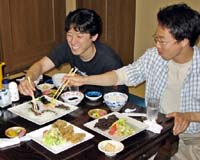 |
Osaka (AFP) March 20, 2011 Japan has again detected "abnormal levels" of radiation in milk and spinach taken from areas near a quake-hit nuclear plant, government spokesman Yukio Edano said Sunday, urging consumers to stay calm. The new tainted samples of milk were found at four sites in Fukushima prefecture, where the stricken power station is located, while one new contaminated sample of spinach was found in neighbouring Ibaraki, Edano said. The announcement -- the second in as many days -- is certain to fuel public anxiety about the ongoing crisis at the Fukushima No. 1 plant, 250 kilometres (155 miles) northeast of Tokyo, and its impact on health. But Edano insisted the public was not at risk. "Even if (radiation) levels are superior, just because they are higher once, twice, over several days, this does not mean they pose health risks, even during a lifetime... So I would like everyone to stay calm," he told reporters. Late Sunday, Jiji Press citing local officials reported that tainted produce -- spinach and other green vegetables -- had been found in Tochigi prefecture, wedged between Fukushima and Ibaraki. Farmers in the affected areas have been asked to refrain from shipping any products until further notice, the report said. The Fukushima nuclear plant was severely damaged by the 9.0-magnitude quake and tsunami on March 11. Radioactive substances have since leaked into the air. Authorities in the affected prefectures are now checking where the products came from, how they were distributed and -- depending on their findings -- are ready to suspend sales. Plant operator Tokyo Electric Power Co (TEPCO) on Saturday apologised for the contamination of foodstuffs and said it would look into compensating the farmers affected, Jiji reported.
earlier related report Supermarkets said they were unable to refund purchases of iodised salt, citing rules that say food cannot be returned if it has no quality problems, state media reported Sunday. Panicked shoppers had set off a run on iodised salt despite government reassurances that China faced no danger from Japan's March 11 earthquake and tsunami, which left the Fukushima No. 1 nuclear power plant leaking radiation. A 60-year-old Shanghai woman told China Central Television (CCTV) that she called the police after a store refused to give her a refund for 50 packages of salt that she bought last week. "I bought this salt at six yuan ($0.91) per pack. Then I heard the supply of salt was not tight so I want a refund," the woman, who was not identified by name, said in a phone interview. A supermarket manager was quoted as telling the Beijing Youth Daily that his store was turning away angry customers and their bags of salt. "The national regulations on returning food are very strict. No refund is allowed unless there is a quality problem. So our supermarket will not give refunds for this salt," said the manager, who was also not named. Similar "refund rushes" were playing out in southwest Sichuan, eastern Zhejiang and Guangdong provinces, the newspaper said. Stable iodine tablets can stop the body from absorbing radioactive iodine after exposure to radiation. Iodine is found in most salt in China as part of a national policy to prevent iodine deficiency disorders, but massive amounts of salt would have to be ingested to have the same impact as a single iodine tablet. China's commerce ministry said Sunday the panic buying of salt had stopped and the market was returning to normal after shoppers had emptied supermarket shelves from Beijing to Sichuan, the Xinhua news agency reported.
Share This Article With Planet Earth
Related Links Space Technology News - Applications and Research
 Radioactive traces found in Japan tap water
Radioactive traces found in Japan tap waterOsaka (AFP) March 20, 2011 Traces of radioactive substances have been detected in Japan's tap water following an emergency at a quake-hit nuclear plant, but are not a risk to human health, the government said Saturday. Abnormal levels of radioactive iodine were found in the water supply in Tokyo and also in Fukushima prefecture, home to the plant located some 250 kilometres (155 miles) northeast of the capital, offici ... read more |
|
| The content herein, unless otherwise known to be public domain, are Copyright 1995-2010 - SpaceDaily. AFP and UPI Wire Stories are copyright Agence France-Presse and United Press International. ESA Portal Reports are copyright European Space Agency. All NASA sourced material is public domain. Additional copyrights may apply in whole or part to other bona fide parties. Advertising does not imply endorsement,agreement or approval of any opinions, statements or information provided by SpaceDaily on any Web page published or hosted by SpaceDaily. Privacy Statement |